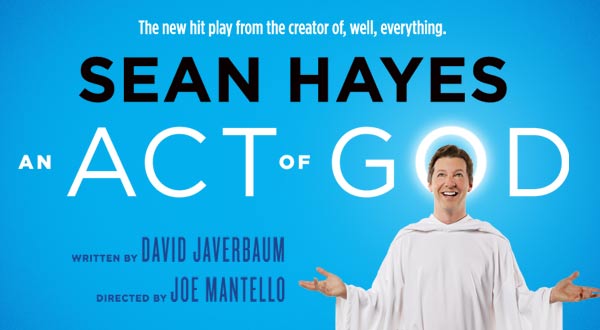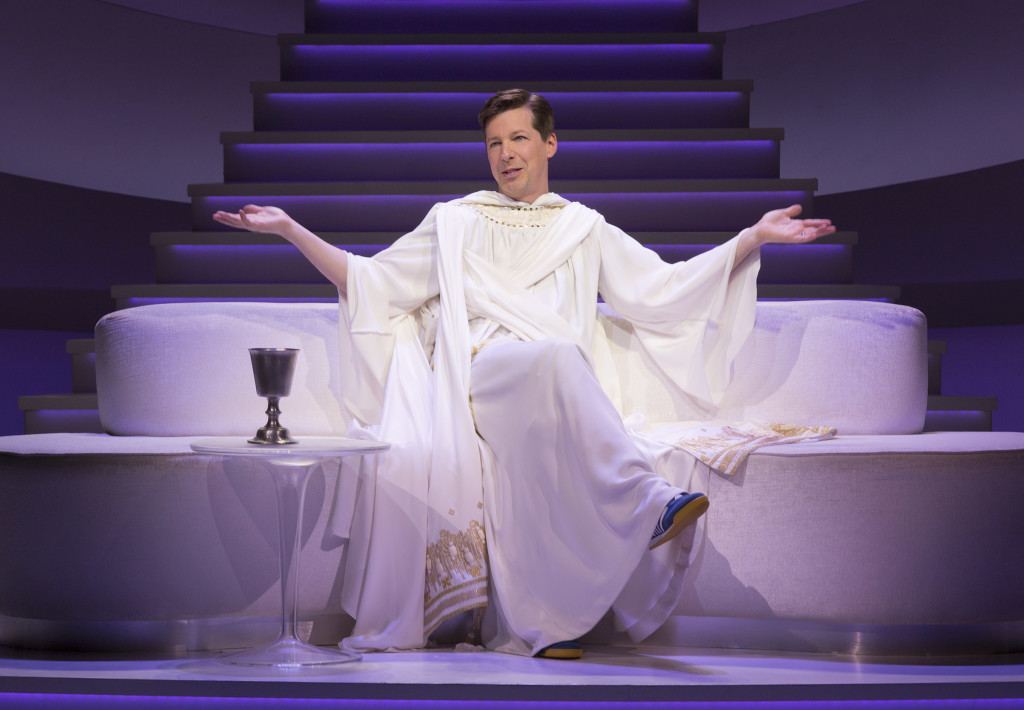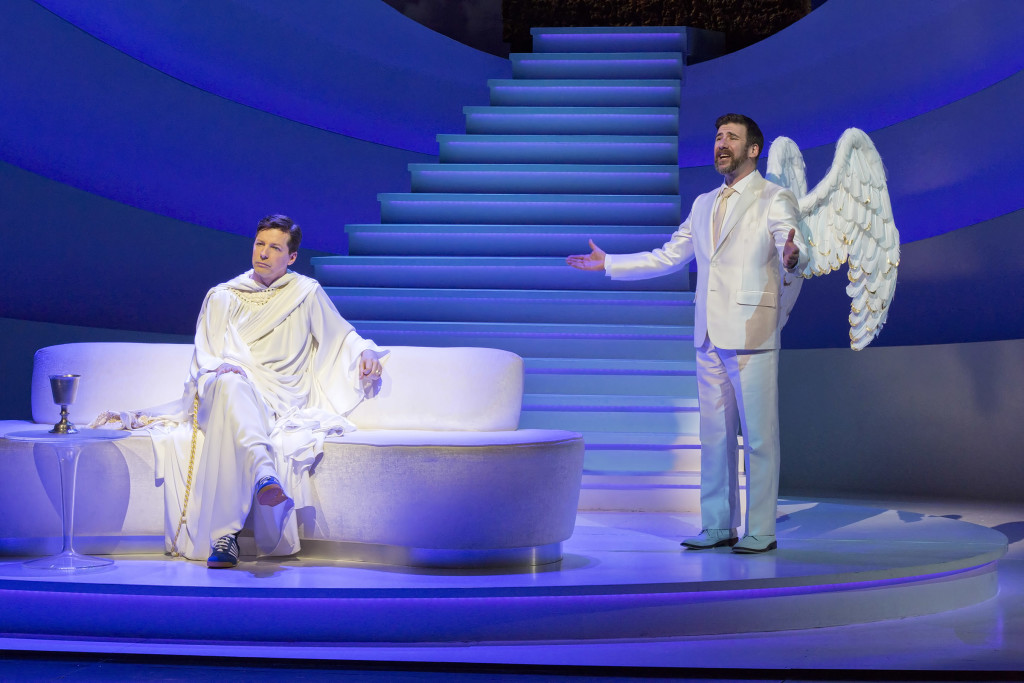
God is really good at making you feel bad about yourself.
Either my Catholic upbringing implanted a constantly guilty conscience more deeply than I thought, or the god I believe in is a critical and hilarious gay man (hi Dad), but somehow Sean Hayes, inhibited by the Lord Our God, saw straight into my ashamed soul as I entered the Golden Gate Theater, late, for a performance of An Act of God. My fellow late-comers and I were herded into the theater from the wings as a spot lit us and Hayes, of Will and Grace fame, began a tangent about keeping the Lord waiting. Oops.
This stand-up style of humor that targets the audience continued throughout the performance (message from God: he’s tired of people calling his name while having sex or masturbating, and he saw a lot of familiar faces in the crowd that night) and provided an effective framework for what An Act of God accomplishes best. Through comedy that places the humor at the mercy (ba-dum-tshh) of a sassy and sadistic deity, we are forced to think about the humor and absurdities inherent in adhering to strict religious and spiritual guidance. The performance does not imply that religion or a belief in God are stupid or ridiculous, but that they can lead humans to believe and do ridiculous things.

Though there are few more ridiculous things than Sean Hayes wearing a bedazzled white robe over his “fashion sneaks” (this is apparently the only kind of sneakers middle-aged gay men wear in public—thanks again Dad), sitting and often sprawling on a long white couch. Is this The Ellen Show? What Freud would be doing if he were still alive? A televangelist? QVC? God, in possessing Hayes’ body to deliver an important message to Earth, reveals Himself as a talkshow-host/therapist/patient/salesman hybrid, ready to sell his subjects on an updated set of Ten Commandments and on his own image.
An Act of God does not quite fit in the realm of other recent religious parodies like The Book of Mormon—its humor is more slapstick and line-driven rather than situational and plot-driven. Hayes sits on the couch for the majority of the show, delivering joke after joke between and among his new set of rules. Though some jokes fell flat, the majority sent the audience into an uproar. We learned that God actually did create Adam and Steve rather than Adam and Eve. He didn’t want to deal with more humans but wanted a good pair of gardeners for his new garden. But Adam and his “power bottom hunk” Steve ate from The Tree of Knowledge That Your Lifestyle is Sinful, and God had no choice but to turn Steve into Eve. How hypocritical, coming from a flamboyant snake still in the closet—have you heard his lisp?
In the interest of spoiling too many jokes, I will simply warn you of some of the areas where God has changed the rules-not naming any countries in particular (but directing this doctrine to only one country in particular), He insists on a separation between him and the state. Also not naming any celebrities in particular (Kanye), He would like to stop being invoked as the cause of celebrities’ talents and accomplishments. Some other changes have happened in the realms of honoring thy children, expecting to be rewarded for faith, and telling God what to do.

If you have questions about what these new commandments mean for your life, you are not alone. Michael (David Josefsberg) shares these concerns as the angsty archangel, who asks pressing questions like “What about all the evidence for evolution?” and “Why do you let good things happen to bad people?” under the guise of pulling them from the audience. God either deflects or explodes at these types of questions, which, along with His occasional moments of depressed introspection upon realizing what a heartless, messed-up God He is, attempt to add a more serious dynamic to the show. However, many of the transitions into these reflections on his sadness and guilt in dealing with Abraham and Isaac, Job, and others read as choppy and incongruent with the rest of the performance.
Whether or not God is an asshole is the least important takeaway from An Act of God. Instead, the last commandment packs the most impact:Thou shalt believe in thyself. God does have an affirming, supportive side, and it is all the more endearing when expressed through Hayes’ and the angels’ (Michael and Gabriel, played by James Gleason) final song and dance that encourages the audience to “Believe in Yourself.” Rather than an insight into existential questions of religion and faith, An Act of God is an entertaining way to spend 90 minutes, challenging humans’ reliance on a greater power through a series of often-cheesy jokes that portray God as less great than we might hope (and an even worse singer).
It doesn’t matter if you believe in God and what He looks like to you. Whether He exists or not, He is present in our society and culture. How and why does deferring to God in so much of our collective language change the human experience? An Act of God won’t answer that question, but it will make you ask it. It may just be He was the only viable co-founder with Steve Jobs of Universe 2.0, or that His jealousy and anger management issues provide effective population control when they manifest in floods or plagues. Whatever His presence means for us, if it continues in the form of possessing Sean Hayes’ body to deliver hilarious comments and stories (wait until you hear the ones about Jesus and his lesser-known siblings Zach and Kathy), I’m happy to have Him stick around a few millennia longer, walks of shame and all.
